The following was found in our archived folders after having remained for close to four years. It shows that there were many who were ahead of the curve in their studies. Enjoy the journey. ~ Ed.
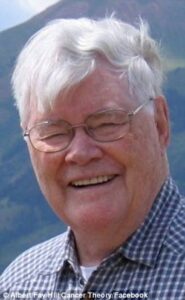 A Denver pastor whose life inspired a Disney film believed he had found a cure for cancer before his death – and his theory is yet to be disproved.
A Denver pastor whose life inspired a Disney film believed he had found a cure for cancer before his death – and his theory is yet to be disproved.
Minister Albert Fay Hill’s battle against the New York mob is the stuff of legends, even inspiring hit 1978 movie The North Avenue Irregulars.
The pastor even won a Bronze Star and Purple Heart as a paratrooper during World War II, but it’s his fight against cancer that is set to become his lasting legacy.
Hill was convinced he had found an innovative immunology-based cure for the disease but died from pancreatic cancer before he ever got the chance to finish testing his theory.
The minister dedicated his life to curing cancer after his wife Grace found a lump in her breast in 1962, the Denver Post reported.
Not the kind of clergyman to give up and put the tumor down to ‘God’s will’ he saw it as a challenge to fight back.
With no specific scientific background or education, he turned to the library where he studied cancer and read hundreds of purported cures until he hit on one that made sense to him – and in which the researcher had found promising results.
Based on his research, his wife Grace went on a strict diet designed to boost her immune system.
‘The thought of trying to find a cure for cancer, to self-educate on that, is a ridiculous thought to most people,’ Geoffrey, Hill’s second-youngest son told the Denver Post. ‘He had to do it. He was obsessed with the idea.’
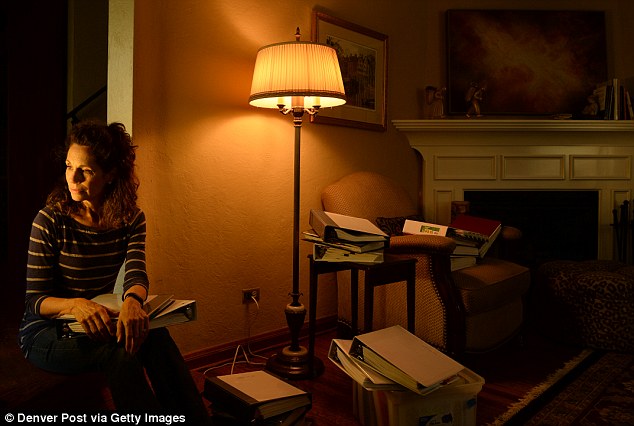
His family (pictrued is daughter Cydney Peshut) still have boxes of his research and are now attempting to publicize his work on social media in the hope that someone picks up his immunology-based cancer research and finally takes it through to next stage
While there is no evidence that this helped her battle breast cancer, she did survive years longer than doctors expected. Sadly, in February 1969, aged only 42-years-old, Grace passed away.
Devastated by her loss but faced with rearing five children by himself, Hill focused on his family and later remarried. Tragically, his second wife, Nancy, passed away from lupus in 2008.
After the death of his Grace, Hill dedicated himself to finding a cure for cancer and was convinced that the answer lay triggering the immune system to destroy cancer cells the same way it attacks infections.
The way to do this, he believed, was through a complex regimen of glucose, insulin and potassium. And in early tests, his theories proved to be successful.
In the 1990s, he persuaded a veterinarian to use his protocol to treat a Rottweiler suffering from a large cancerous tumor.
Incredibly, the tumor liquefied within 48 hours and the successful result encouraged his younger brother Les and several friends to invest in scientific testing and patents.
A successful scientific study with mice, carried out with an assistant professor at the University of Colorado medical school, found that subjects that underwent the ‘cure’ showed significant reductions in tumor growth compared to the control group.
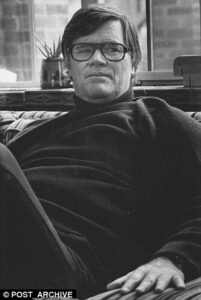 Another test, this time with physician Bill Polvino, was able to replicate the success of the first and its results were published in 2005 was published in the Journal of Immune Based Therapies and Vaccines.
Another test, this time with physician Bill Polvino, was able to replicate the success of the first and its results were published in 2005 was published in the Journal of Immune Based Therapies and Vaccines.
With such promising results, the next step was to refine the protocols for human trials.
Unfortunately those tests never took place. Before they could progress, Hill’s brother Les died and along with him, the funding for the project.
With no ‘miracle drug’ to allow pharmaceutical companies to claw back the money they would have to spend on development, Hill’s research came to an abrupt end.
‘There’s probably a million things out there that might work, where we haven’t formally given it a full shot yet,’ Polvino told the Denver Post. ‘Of those million things, we can’t do them all. The reason this one bothers me is because I saw it. And I haven’t seen it formally fail.’
Hill, who kept a framed printout of his trial’s successful results hanging on the wall of his office, always hoped he would get another chance to prove his protocol worked.
So when he was diagnosed with advanced pancreatic cancer in March 2014, he was not afraid. Instead he saw it as his final chance to carry out the human trials on himself.
‘Dad said flat-out he thought it would probably kill him,’ David said. ‘He thought he was already too sick to be saved, that the (immune) reaction would be fatal. But he wanted to be allowed to do it, so doctors would have in their notes what had happened. That would be his final test.’
Given just three weeks to live by doctors, Hill and his family rushed to get approval for the risky procedure.
But the minister never was one to back down in the face of overwhelming odds.
At 18 he went off to fight in the Second World War with the paratroopers and soon found himself in the middle of the Battle of the Bulge.
When a German Panther tank came across his squad, he used a hastily-borrowed bazooka to destroy the threat, earning a Bronze Star and Purple Heart.
But atrocities of war stayed with the impressionable young man and after he returned to the United States, Hill set his sights on the ministry.
He studied psychology and theology at DePauw University, where he met his shy wife-to-be Grace Grogan, and they married before he headed off to New York City where he attended seminary.
Hill became Assistant Chaplain at the U.S. Military Academy where he coached boxing and joined the fight against McCarthyism.
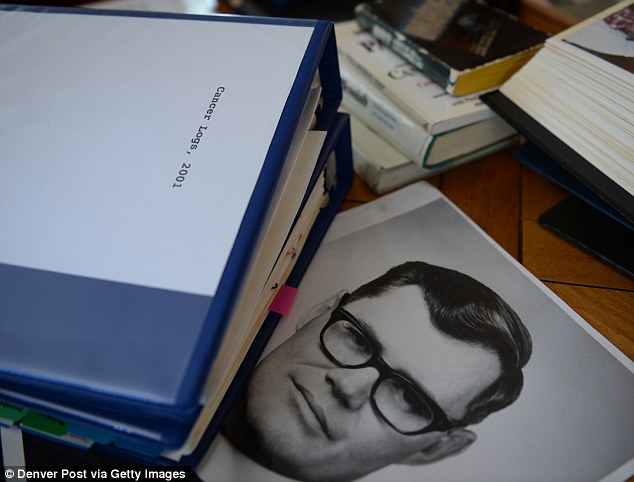
Hill never got to carry out his human trial. On May 1, 2014 he died from pancreatic cancer aged 88, just six weeks after diagnosis but his family have kept the research in the hope that someone else will pick up from where he left off
By the time he had his own congregation in New Jersey, he was also leading the fight against the local slumlords.
Racial equality was another key belief of Hill and in 1963 he traveled to Washington D.C. to join the freedom march and witnessed Martin Luther King Jnr.’s famous ‘I Have a Dream’ speech.
In the 1960s the brave pastor famously worked with the U.S. Treasury Department to organize a citizens’ task force against the mob.
He used volunteer women from his congregation, nicknamed the ‘lace pants brigade’, to go undercover to report on criminal gangs.
The initiative was so successful that the Mafia allegedly took out a contract on the minister who began carrying a gun for protection while police parked outside his home 24 hours a day to prevent an attack.
He later received the U.S. Attorney General’s Carl M. Loeb Award for Citizen Valor for his efforts.
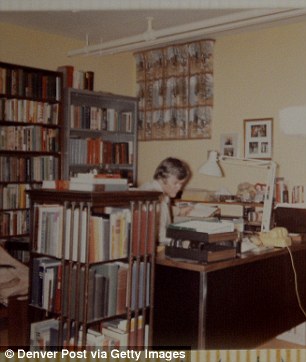 The minister’s book about the undercover operation, The North Avenue Irregulars, was picked up by Disney and made into a hit film in 1978. Hill admitted he had been surprised producers had decided to make the real-life story a gentile comedy but said he had made his peace with the film.
The minister’s book about the undercover operation, The North Avenue Irregulars, was picked up by Disney and made into a hit film in 1978. Hill admitted he had been surprised producers had decided to make the real-life story a gentile comedy but said he had made his peace with the film.
When he came to face his final battle, with the disease he had been hoping to cure his entire life, Hill was determined not to let his diagnosis go to waste.
His lawyers contacted legislators who supported Colorado’s Right to Try Act, which allows for use of experimental drugs by terminally ill patients in some cases.
Some of those legislators attempted to find doctors who would agree to test the protocol on Hill but could not find anyone willing to take the risk.
Hill never got to carry out his human trial. On May 1, 2014 he died from pancreatic cancer aged 88, just six weeks after diagnosis.
Lawyer Ellen Winner filed one last patent for Hill – to allow all his life’s work and research to be published together for the public.
‘He wanted everybody to be able to use it,’ Winner says. ‘I think that was on his mind. He wanted to give it to the world, to put it out there in a publication.’
His family still have boxes of his research and are now attempting to publicize his work on social media in the hope that someone picks up his immunology-based cancer research and finally takes it through to next stage.
‘His fear was that his work would die with him, and if there was something there, it wouldn’t get pursued,’ says Jim. ‘He thought he had it. He really did.’
Written by Hannah Parry for The Daily Mail ~ October 18, 2015
FAIR USE NOTICE: This site contains copyrighted material the use of which has not always been specifically authorized by the copyright owner. We are making such material available in our efforts to advance understanding of environmental, political, human rights, economic, democracy, scientific, and social justice issues, etc. We believe this constitutes a ‘fair use’ of any such copyrighted material as provided for in section 107 of the US Copyright Law. In accordance with Title 17 U. S. C. Section 107, the material on this site is distributed without profit to those who have expressed a prior interest in receiving the included information for research and educational purposes. For more information go to: http://www.law.cornell.edu/uscode/17/107.shtml

